#which reflects their attitudes towards their ‘innermost fires’
Text
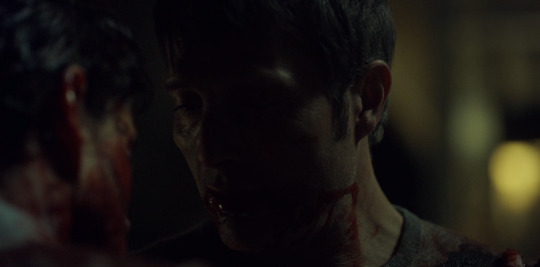


NBC's Hannibal, The Wrath of the Lamb 3x13 / Poppy Z. Brite, Exquisite Corpse
"You are alone, because you are unique"
"I'm as alone as you are"
#i feel like will felt the former more (intimately invaded threatened)#and hannibal felt the latter more (fell to its knees and sobbed in gratitude that it was no longer alone)#which reflects their attitudes towards their ‘innermost fires’#hannibals embracing of his own and will’s suppression of his own#idk what im saying tho its been a minute and im rusty lol#nbc hannibal#hannibal lecter#hannibal#will graham#hannigram#hannibaledit#poppy z brite#exquisite corpse#pluto web weaves#the wrath of the lamb#hannibal 3x13
495 notes
·
View notes
Note
Ok so since you’re a believer/supporter of Agnes Gate I have this question. Lizzy’s memories were wiped, but how do you explain Red? What does he know/suspect? How do you explain his behavior? Where does he stand in all this? Hope you got my point because I’m sick and I’ve lost my ability to think clearly and transform thoughts into words 🤒😂
*cracks knuckles*
Yes, you’re coming across clearly, anon, these are all valid points/questions, and I hope you’re feeling better.
Now “believer” is a strong word but I do believe there’s enough wiggle room in current show canon to accommodate this theory. In other words (bc I really don’t want anyone to misunderstand me here): there’s still enough story space for this idea to emerge but there is no direct, overt proof that it is there or that it will.
So consider what follows NOT a proof post but a simple, albeit long AF - thought experiment that presupposes two things:
Liz and Red slept together while on the run (canonically that’s the period when Agnes was conceived)
Liz’s memory of this has been either altered or removed by Dr. Krilov
Now, behavior was, in fact, the one thing that initially put me off this theory bc I didn’t think Red would be willing to just step aside if he suspected he might be the baby’s father. BUT the following seasons revealed a couple of good reasons why he would not speak up (Kirk and the never-ending list of other hostiles, Liz’s “I hate your guts” phase, Liz clinging to Tom, Liz’s selective memory - courtesy of Krilov, fake-DG & the issue of the suitcase, an illness).
They also continued to show just how apt both Red and Liz are to not deal with stuff that’s not an immediate threat (e.g. Liz’s ‘I love you’ which they both willingly continue to just not address), and the thing is: despite not contesting paternity in any overt way, Red never actually stepped aside.
I think this paternity issue and its various complications - from Red’s perspective - can be separated into 4 major time blocks:
S3B
S4
S5A
S5B–present
Even if there’s a reason for Red to think he might be Agnes’ father, I don’t believe he works off anything more than mild suspicions in the S3B–S5A period.
During this time, his relationship with Liz is rapidly unraveling and several other roadblocks and threats emerge that likely discourage him from openly broaching this issue. Then he gets to raise Agnes for 10 months, which provides the perfect opportunity to safely run a paternity test and maybe even another genetic screening (they made a point of telling us that baby Agnes was getting a standard one back in S3 + it was emphasized how having the correct info about her parents’ medical history is crucial for accurate testing - info Tom couldn’t provide). The beginning of Red’s collaboration with Dr. Stark roughly dates back to the time period when he had Agnes with him. If Red has a hereditary (late-onset) illness, he could have been driven to seek a cure once the tests confirmed his suspicions, and he’s now testing it on himself to make sure it works and is safe before giving it to Agnes.
IF.
– more on all this behind the cut – (apologies, mobile users)
- [ S3B ] -
Confirmation of the pregnancy is a wedge between Liz and Red, and it’s Red who screws up first when he rejects the baby right off the bat and tries to bury himself in work. It understandably hurts Liz and the tense tone of their interactions begins to snowball. The main issue concerning Red’s behavior in S3B, right after Liz tells him that she’s pregnant and he bounces back from his initial rejection, is that he becomes “suffocating” and more committed than ever to keep her and the baby in his orbit (which also alarms and later sets off Mr. Kaplan). Red has little sense of boundary, he starts isolating Liz, and he barely tolerates Tom’s presence. When he makes an effort to tolerate him, that’s bc he is trying his best to respect Liz’s choices/wishes (just like in “Ruin”) regardless of his own feelings, but it doesn’t prevent him from repeatedly trying to push Tom out of the picture. He saves him from going to prison but he still has a hard time dealing with Liz having a close relationship with him. This also echoes his original plans for Tom: being there for her but also keeping his distance. This, in turn, echoes his original “invisible benefactor” role he cast himself in (and both of them clearly crossed these lines as the years went by – more on this later).

Despite telling her that he’s known about the pregnancy for some time, Red does not act out until after Liz doesn’t deny that Tom is the father. Red knew about the pregnancy already, he had weeks to vent and get used to the idea, so his spiraling is kind of puzzling unless it’s not the pregnancy itself that sets him off. The only thing he wasn’t sure about was paternity (why?), so the only emotionally logical reason for his weird spiral is that part of him was still hoping that the baby was not Tom’s (tho, in theory, nobody else was in proximity other than the two of them + a more closer look at the timeline reveals that Tom was, in fact, nowhere near Liz when the baby was conceived).
But when Liz didn’t deny it, that’s when it became too much for Red: he didn’t want to have a child (for several reasons) but what he wanted even less was Tom to be confirmed as the father. Then his entire outlook on this subject changes by the end of the episode (after reminding himself how Katarina, too, dreaded having a baby but changed her mind completely). This also brings that Samar/Aram conversation to mind where she tells Aram how being around him changed her attitude towards having children, but now she cannot raise one bc of her condition.
But back to 312 and the “I’m pregnant” moment:
This whole conversation is just weird. Red is tense from the moment he sees Liz at the Post Office, then feeds her the answer to his own question, presenting it as a statement: “I assume Tom is the father.” Why not just give her the opportunity to name him? What this feels like is him giving her an out instead, and his closed-off, prickly, I-am-being-very-inconvenienced-by-this behavior (and Tom’s enthusiasm) is practically willing Liz to take it. And she hesitates for a moment, then instead of saying “yes” she just says, “I haven’t told him yet.” And this is where Red’s barely civil behavior veers into total assholery rejection, then he does a 180 at the end of the episode. By then Liz is sufficiently pissed off and is already pushing him away and sliding back into Tom’s arms. So in many ways ep 312 is where things truly turn and then get worse, and it all happens over Tom, essentially.
After this fallout, we get the episode where Red is thinking back to Josephine who was maneuvered into marrying an abusive scumbag for strategic reasons (as usual, we have parallels too). It was all arranged by a third party, which reminds me of Mr. Kaplan referring to Tom as her “confidant”, which makes me wonder about the extent of their off-screen interaction. Mr. Kaplan was doing everything to tear Red and Liz apart bc she saw that bond as fatal to both and a danger to the baby. Maybe she arranged that 2nd session w/ Krilov (who might have planted images that switched Red and Tom like he did w/ the fire memory where the roles were switched around), then she tipped Tom off, urging him to rekindle his relationship w/ Liz (his proposal was so out of the blue, I still don’t know what to do w/ that).
When Liz wants to give up the baby for adoption, she is told that she has to discuss this with the father, too, as his consent is also needed. Liz says the father is busy with work, then she has 0 conversation about this w/ Tom and goes to Red who, now being very pro having the baby, tries to talk her out of it. He also sabotages Tom’s teacher job and, at the same time, swoops in and presents Liz with a trust fund he set up for the baby, insisting that it’s for the child. As far as symbolic actions go, this one is screaming “I am the provider, not him”. And if it’s not clear enough, he also spells it out by telling her Tom’s not worthy of being her husband and of raising the baby. But it’s too late. Liz rejects him and clings to Tom. She even re-watches the video of Tom being interviewed as a potential adoptive father, which we saw in S1. Liz has been show to chat with potential adoptive parents, so her watching Tom’s adoption agency interview kinda makes it look like she picks Tom to “adopt” Agnes.
S3B is the time period when the threat from Kirk starts emerging. Mr. Kaplan also begins to view Red and Liz’s bond as sth to sever and Red himself as a threat to Agnes, saying that the baby hasn’t even been born yet but is “already paying the price for her association” with him. Then Liz kicks Red out when he asks to see the newborn baby, and soon after Liz’s “death”, Tom tells him that Agnes would only need protection if Red remained in her life. The three of them manage to gaslight Red to such an extent that he completely breaks down. He begins to contemplate ending it all and wanders around, cataloging the reasons.
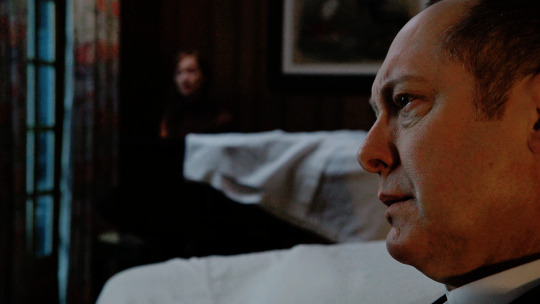
And that episode-long contemplation is where we get to see (his version of) Katarina in this exact position, her pain at losing the man she loved at a time when there was so much anger and tension btw them, at not being able to raise her daughter, and all her reasoning for committing suicide (all paralleling Red’s). We can also glimpse Red’s innermost thoughts/feelings regarding Liz, Agnes, and Tom. He says “her mother is dead. All she has is the father.” Somehow he cannot bring himself to call Tom “her father” and this is reflected in future real-life interactions w/ Tom as well, when he switches between calling Agnes “Elizabeth’s child” and “your daughter” in his presence. Liz similarly switches btw calling Agnes “my” and “our” around Tom, and initially she refuses to refer to Agnes as anything but “my baby” even after Tom corrects her. It’s almost like both she and Red need some time to adjust. She does. Red? not so much.
Dom further adds to Red’s crushing guilt by reminding him how his choices doomed Liz like they doomed Katarina before. But then he also reminds him that he still has a reason to live as there are others out there who depend on him (“God help them.” - I LOVE Dom). So Red returns to make sure Agnes is safe and to exact vengeance for Liz’s death, two goals which are tied in his mind as he claims that the only way to protect Agnes is by killing Kirk who’s responsible for Liz’s death. He makes a deal with Tom: he lets him participate in the hunt in exchange for being allowed to spend time with Agnes. Again, this whole exchange has a vibe of negotiating visitation rights.
And Red’s interactions w/ Scottie give us a feel for why he will not argue much in the future when Liz decides to pick her to look after Agnes: Red calls Scottie “a brilliant strategist” who - despite Red’s visceral dislike of her - is a suitable “guard” as long as she believes Agnes to be her granddaughter. So not giving any reason to undermine that belief is in the little girl’s best interest (for now).
- [ S4 ] -
This is a period dedicatedto the overarching theme of “truth vs. appearances”, and we have afew interesting ideas and info snippets introduced that can help furtherexplain Red’s behavior if (he suspects that) Agnes is his.
First of all, we meet Kirkand gain some insight into the relationship dynamics of the past - dynamicswhich reflect those in the present.

Mirroring is a curiousfeature that’s utilized right at the beginning, in 401. It’s briefly touchedupon (here) but what makes the Red-Kirk-Liz scene especially interesting isthat the mirroring btw this exchange and the Red-Tom-Agnes one in “CapeMay” is not merely visual but also verbal, giving some weight to thesuspicion that they are linked by design. In both scenes we have the“designated dad” in a room with his daughter while the real father(Red is not Liz’s father but in 401 he “stands in” for real Reddington) is separated and looking in from the outside. On top of that, the dialogues are verysimilar, too:
Red (401): Are you okay? || Red (319): She’ll need protection.Kirk (401): Unlike you, I’d never hurt my own daughter. || Tom (319): Only ifyou are in her life.
And to push it even further,Kirk’s words (“What I desire is to raise my child. To watch hergrow.”) reflect Red’s innermost wish he voices in 319: “ I’d giveanything to be a part of that child’s life […] see her, hold her, watch hergrow.” And this also echoes Liz’s fantasy she shares with Red when theyare on the run. And Red’s retort to Kirk in 401 (“She was never yours toraise.”) also matches Red’s dance around the issue of Agnes’ paternity in319 where he refuses to directly call Tom her father, paralleling Katarina’s pain that she feels due to being separated from her daughter.
So I think what we can statewith certainty here is that there is confusion around paternity inboth scenes.
As the season unfolds, we dolearn that Kirk was a “cover dad”, designated as such by Katarina formultiple reasons (that happen to match Liz’s reasons for wanting to“escape” Red in S3 and be with Tom instead):
best chance at a normal life: Kirk did not work as an agent or any kind ofoperative, he had a (relatively) stable life in Russia. Katarina wasmarried to him and they lived together until real Reddington, believing Mashato be his daughter, took their daughter back to the US.
safety: asRed put it, “Your safety was guaranteed because Kirk believed you to behis daughter.” This belief was cemented in by a fake DNA report andentries in Katarina’s journal where she writes about their relief that Mashawon’t be exposed to the genetic illness that plagues Kirk’s family as it canonly be inherited by sons.
“no other path”: despite loving Reddington, Katarina accepted that she was never gonna endup with him. The circumstances were forever against them. This is why she began distancing herself from him and this is why she didn’t want to know ifhe was Masha’s father.
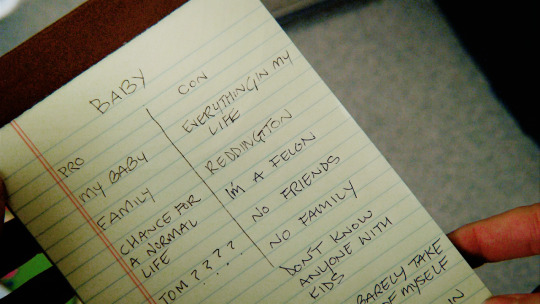
If Katarina had written apro/con list for her baby, I bet it would have looked a lot like the one Liz wrote, exceptit would have said “Kirk????” instead of “Tom????” But, as Redtold Liz, being Katarina’s husband didn’t make Kirk her father, which is apotentially relevant observation given how Liz kept trying to marry Tom at allcosts to force a “normal family” into existence that was never more than anillusion + how she was trying to distance herself from Red.
Those three main reasons abovealso provided the motivation for a cover-up that Kirk refused to acceptas the truth until multiple tests confirmed it when he fell ill and needed agenetic donation from a blood relative. As Red pointed out, “You saw whatKatarina wanted you to see.” This also echoes Mr. Kaplan’s words to Red atthe end of S3: “You saw what we needed you to see.” which might godeeper than “merely” faking Liz’s death and could be a hint at Kaplan’srole in arranging the 2nd memory manip session with Krilov.
In this season, Red alsostruggles with appearance vs. truth, with the cost/benefit ratio of deceptionsand false assumptions. This happens indirectly when he “auditions” hisnew cleaners in a pristine white apartment where one of his friends wasmurdered. He is both upset and marvels at how clean everything looks –“your cleaners removed even the memory of his blood”.

This practicality takes on asymbolic meaning as it carries over into Red’s relationship with Mr. Kaplanwhom he calls his confessor: “every trespass I committed, expunged.Cleansed as if it never happened.” Mr. Kaplan claims that Red betrayed Lizand held her “emotionally hostage”. These are rather extreme accusations… unless Red and Liz slept together while on the run and Redconfessed this to Mr. Kaplan. Now that act could be easily and understandablyconsidered trespassing by her, a crossing of a line that never should have beencrossed (= a betrayal). Red felt rage when he learned that Tom had become intimate with Liz. He considered this a betrayal, too, and Tom an immediate threat. He went about correcting the situation the same way Mr. Kaplan goes about correcting Red’s behavior in S3B-S4. Perhaps the trigger was the same type of trespassing too.
Mr. Kaplan makes it her mission to separate Liz and Red,and it all begins back in S3, around the time somebody hired Dr. Krilov to takecertain memories from Liz. Red is very close to directly confessing his feelings for Liz in 302. If he ended up confessing that he’s in love with her and they ended up in bed, that can be considered “a truth” about him that Liz uncovered – a truth that someone who doesn’t want them to be together would definitely object to.
Mr. Kaplan urges Liz to “do what yourmother never had the courage to do: walk away from Raymond.” IF Red and Liz slepttogether and Agnes was the result, then Dr. Krilov’s 2nd memory manipulationdid what Red’s cleaner(s) did in the white apartment: the “trespass” got “expunged”. Even the memory of it.Truth became elusive and assumptions took its place (like “I assume Tom is thefather.”).
Red is trying to complete a white puzzle in the white apartment,which takes on potential relevance after we can hear him compare memory toa jigsaw puzzle in 514. The possible relevance? Maybe he’s wondering (puzzled, if you will ;) why Lizacts as if nothing happened between them on the run, as if her memory of it were wiped clean. And while it is undoubtedly simpler and safer thisway, and it’s best to leave that topic alone, it is hard for him to accept, esp with Tomin the picture and taking on roles Red wishes to be able to fill, roles Liz now rejects him in.
In this episode we can also hear Gale make a pointed, suggestive remarkto Liz about her time with Red in S3A: “What was it like on the run withhim? Did he charm you?” And all this happens while Mr. Kaplan is hell-benton tearing Red and Liz apart for the sake of all of their safety, claiming thatRed’s presence in their lives is a threat to Agnes, Liz, and also to himself.

Memory manipulation - or the presence of holes in one’s memory - has itsown “footprint” in the show. It usually manifests as images drifting outof focus and echoing voices. There are two instances where this happens to Liz with no apparent reason. One is in 308 when she is in a gas stationbathroom - already pregnant - staring at her reflection in the dirty mirror. The other is in 317when Red marches towards her in the church, calling out her name and interrupting her and Tom’s wedding -both are situations where her baby’s father and her husband are likely on her mind. In317 she even connects the two by saying she wants to build a life with thefather of her child and Red keeps pleading with her to not marry Tom.
We are periodically reminded that Red is a Proust fan, and Proustjust happens to be the author of À la recherche du temps perdu (In Search of Lost Time) - a monumentalexploration of the various connections that web reality, perception, and memorytogether. The concept of involuntary memory originates from this novel series,and we can see this in action on The Blacklist, too, when Liz’sburied memory of the night of the fire gets triggered in 222. It’s also possible that she was close to being triggered in those twoscenes mentioned above, and maybe she won’t even need Krilov’s help in regaining the memories she’s lost the 2nd time as they could also be triggered unexpectedly by the smallest, most random thing - a smell, a taste, a voice, a gesture.
The white apartment incidentalso coincides with Liz, Agnes, and Tom moving to a new apartment. Redhas a hard time adjusting to this change, to no longer being able to see Agneswhenever he wants (and he was visiting her regularly while they were in his safe house, always showing up w/ the request to see her in particular), which brings the downside of deception into focus: separation. And Redstruggles with this despite understanding the safety that lies in it and inhiding truths - something Katarina knew a lot about, as well.
It’s not surprising that he soon starts musingabout the importance of truth (in 412):
“You said something before. The truth doesn’t matter, that the only thing in this world that matters is just the appearance of truth. I fear you might be right about that. Lately I find that the truth has become… so elusive. Often imaginary. But in the end, it’s all that we’re left with, isn’t it? What is real, what you can taste and touch and feel. The words that pass between us as we look each other in the eye are… all we have to hold on to. The truth. I hold it dear.”
then he proceeds to make a cuckoo clock forAgnes in the following episode (x, x). His first remark on how he is no longercomfortable with the idea of dying at any second also pops up in 412, and itgets reaffirmed in 415, in the same episode where the bad guy of the weekexpresses the same sentiment: his reason for clinging to his miserable life is fatherhood andhe wants a family even if he is barred from being physically present in their lives.
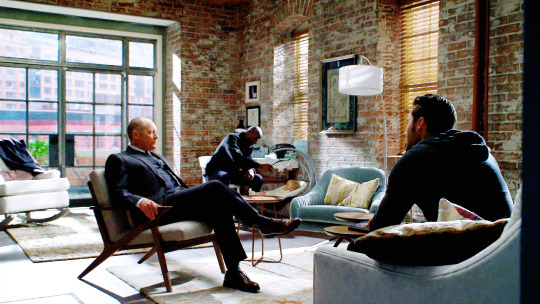
Red faces this issue, too. Tom remains Agnes’ (designated)dad and Liz’s husband while he is now kept away. He stillkeeps prodding that family unit, though, keeps teasing Tom about his pastand keeps involving him in missions to strip away his thin veneer of “normaland safe” to prove to Liz that she is mistaken about him. (sidenote: Tom also“takes over” the sentiment of Liz - and Agnes - being his future; thisis Red’s “thing”, has been since S1)
Meanwhile, Red keepsflip-flopping between accepting Mr. Kaplan’s accusations and rejecting them (“Maybe I am the person you need protection from.” vs “She was wrong to think Elizabeth and Agnes were safer without me in their lives.”). Hecannot seem to make up his mind as others join the chorus of blaming him forhow badly things turned out.
This is also the seasonwhere Red has an awkward and out-of-the-blue exchange with Cooper about thelatter’s sick daughter (414), and in another ep (404) - one featuring a parentand child sharing the same disorder - Red is asked point blank if he has achild with special needs but he doesn’t answer.
His personal struggle with appearancevs truth, however, is temporarily suspended when Liz blindsides him with the DNA test in 422. Despite his visible discomfort, Reddoesn’t correct Liz’s false assumption because it happens to provide theperfect cover he so desperately needs to find the skeleton Mr. Kaplan unearthed.But this strategic move comes with the price of having to keep his silenceabout Agnes for the foreseeable future. Thanks to Mr. Kaplan’s parting gift andCooper’s (accidental?) “antidote” of running that DNA test and providing cover, Red is now backed into a corner where the only way topreserve his secret is by not challenging appearances.
- [ S5A ] -
this block is nestledbetween two high-impact turning points: the DNA test and Tom’s death. The DNAtest locks Red into a false role, that of Liz’s father, which holds throughoutS5 and to a lesser extent in S6. The only reprieve is the 10-month period duringwhich he gets to take on the role of father in Agnes’ life (=inhabiting thetruth). Liz spends this time unconscious, which I find quite symbolic, as well (her being not conscious of his true role).
The DNA test is both a curseand a blessing. Red undoubtedly enjoys the sudden warming of his relationship with Lizbut he clearly does not enjoy her referring to him as “father”. Everytime it happens, we can see him wince, cringe, or glare in silence. But it happensto be the perfect cover for him to keep searching for the skeleton since it preventsLiz from asking the very questions he doesn’t want her to wonder about.
So Liz confrontinghim with the DNA test closes the window of opportunity Red still had in S3B andS4 to contest paternity. This turn of events also forces him to prioritizepreserving his secret over almost everything else (he is only ready to give it up when he thinks Liz’s life is at stake), so the struggle we can see him having in S4 - the onebtw appearances and the truth - promptly takes a back seat as keeping upappearances becomes the #1 strategic necessity.
That being said, Red still onlydoes the bare minimum (= not denying it outright) to play father to Liz. And this time block brings some interesting remarks about geneticsand secrets, which may have more significance than simply serving as empty redherrings until the impostor reveal hits at the end of the season.
Smokeydrops some comments about being “just like daddy” and having “noway to avoid the family curse” because “DNA is what it is.” Onthe surface this ties into the (beyond grating) tendency of some characters to blame-shiftand refuse to take any responsibility for their shitty life choices. But what makesthis exchange stand out is the wording “family curse” becauseKatarina uses a similar phrase (“this accursed disease that has afflicted his family for generations”) to describe Kirk’s condition.In 506, Tom also remarks to Red that “family secrets” always comeout. And now Red is sick and is in need of a pioneering geneticist’s help to find a cure. Somehow I don’t believe this is all just coincidence. + judging from those (brief) (glimpses) we get at Agnes, she is already a lot like her dad. ;)
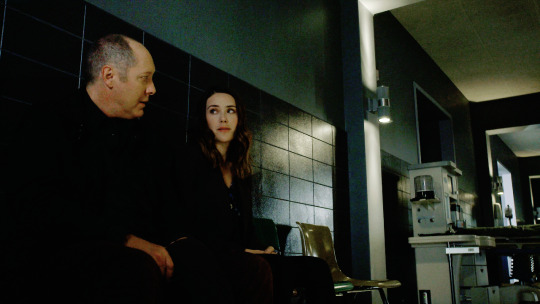
Ep 504 in particularhas some curious details because they don’t line up with Red and Liz’s pretendrelationship but they do line up with the idea of Red having “a familycurse” that puts Agnes at risk. In this episode, asoldier gives up her child to get him out of harm’s way, but when the child presentswith an incurable disorder, she takes him from his adoptive parents, thencommits suicide to provide the donor heart needed to save his life. Witnessing this,Red remarks that “given the same circumstances, I’d like to think I’d beas brave as her. I know I’d wanna be.”
And then Tom dies, Liz endsup in a coma, and Red is left to take care of Agnes. If she is his, this 10-month period gives Red the perfect opportunity to finally confirm it and, asI mentioned above, have her tested for whatever disorder he knows he - and thus she too -carries. The timeline is always tricky on this show but by my rough estimateRed invested in Dr. Stark’s gene hacking research around the time he still had Agnes or not long after.
- [ S5B–present ] -
In this period, Red shouldalready have confirmation about paternity, about whether or not Agnes is atrisk, and Dr. Stark is already working on the cure for both. However, theskeleton and all the threats attached are still out there, circling them, and Liz is stillunder the impression that he is her father, which Red cannot push back againstif he is to keep his main secret secret.
We’ve seen how far he is willing to go tokeep his identity hidden, so letting Liz believe he is her father is really notall that out there for this guy. Only life-and-death situations can push him to reveal certain things, so it might be unruly genetics that will end up forcing his hand this time around. If Agnes needs treatment, that’s gonna be tricky to administer w/o somebody eventually noticing.
Red is still in a false role for now but its confines have weakened since he realized that Liz now knows he used to be someoneelse.

WhenLiz decides to go away for a while and entrusts Agnes to Scottie, Red questionsbut eventually goes along with her decision. “It was what youwanted,” he tells her later on. Even locked in his assumed role hecould have dug his heels in and claimed that he had a say in this matter, but he letLiz make the decisions and respected them. It carried way more risk to let her disappear alone than to let Scottie take Agnes, yet Red did not argue and did notrepeat the mistakes he made in S3B when things got so out of hand, Liz began toresent him and he was genuinely worried he was suffocating her. So he did what everybody toldhim to do in S4: he let her - and Agnes - go. And then she came back to him.
But for now, it is best if Agneshas safe distance from both him and Liz. In 520, Red told Jennifer that she was notabandoned but protected. That’s Agnes, too. Red may detest Scottie but he doesacknowledge that she is an excellent strategist with the skills, insight,motivation, and resources to keep the little girl safe. Shebelieves her to be her granddaughter, which - imo - in Red’s book ensures her loyaltyno matter how he feels about her otherwise. And in ep 512, we can see that Redknows exactly where Agnes is and, knowing him, he has his own invisiblemultilayered security web in place, monitoring everyone in Agnes’ life 24/7 and sendingdaily reports to him.
Whenhe and Liz observe Agnes from a distance at the end of the episode, the topic oftruth once again emerges, making it the third time that Agnes and talk of“the truth” co-occur: one is earlier in this episode (“If I misseven one more day with [Agnes] than is absolutely necessarybecause you’re not being completely honest…”)and the other is the cuckoo clock scene in S4. Red tells Liz heknows how hard this separation is and that they want the same thing here, whichechoes his remark in S4 about how they are in lockstep where Agnesis concerned. It also reminds me ofhis stunned reaction when Liz shares her fantasy with him in S3 (“I’mwalking in a park with my husband. Inbetween usis our little girl. I’mholding her hand in mine… and Inever let go.”). They do want the same thing and they are on the same page about Agnes, but everything else is still in disarray. For now, there is safetyin separation and keeping up appearances, even uncomfortable and painful ones.
In 514, Red gives us and Liz areminder when he points out that in the criminal underworld you can neverreveal how important someone is to you without making them an instant target. Theshow continues to provide examples of this specific danger, and the cases thatdirectly touch upon this topic “borrow” elements from Red’s situation: in518, Mosadek’s son is abducted by business associates because they suspect himof being an informant, and in 610, criminals attempt to extort money from a fatherwhose daughter was born premature with a condition to which there was no cureat the time, so the father came up with one.
Ep605 is extra curious because it features the story of a guy who never knew hisfather and only learned about his identity when he was unexpectedly summoned to the readingof his will. Van Ness was fighting an illness, too, and decided to change hiswill to include his only son that nobody even knew about. His last written message to himwas: “I loved your mother but didn’t have the courage to stay withher.” Van Ness’ seat and vote in an international criminal syndicate are also automaticallytransferred to his heir, making him a target for various reasons. It’s also a reminder of what kind of dangerous entanglements thechildren of international criminals have to deal with once their family ties arerevealed. In this episode, we also get a reminder from Aram that “in arelationship, the truth always comes out.” and Dembe continues toplead with Red to be honest with Liz, tell her the truth and leave the rest to fate. Red, however, stubbornly keeps his silence.
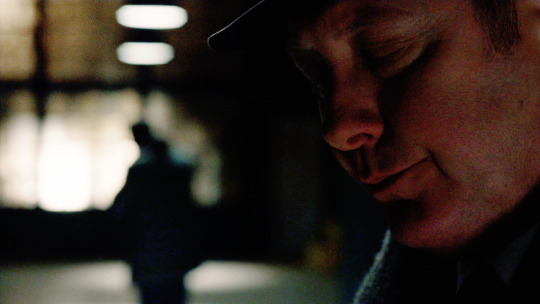
Theparallels btw Red/Liz and Samar/Aram also continue in S6, and what Samar tells Aram in 613has potential relevance to deciphering Red’s perspective and reasons for not speaking up about Agnes. Samar says that she made peace with the idea that she was never gonna havechildren (back in S3, she told Liz she picked career over family) but meeting Aram changed everything. After that, she wanted nothingmore than to try and balance the two, to build a family with him. But now that she knows she has anirreversible condition, she cannot raise a child, and she feels he deservesmore than what she can give.
Ifeel all these sentiments also play a role in how Red evaluates the possibilities of hisrelationship with Liz (even if Agnes is not his). His initial reaction to the baby was rejection,remarking that a child would make their difficult work infinitely harder. But then he changed his mind. In 319, he confessed that hewould give anything to be able to raise Agnes but he was also painfully aware of the factors preventing him from realizing this wish.“Your baby deserves more than we can provide,”Mr. Kaplan told Liz right at the moment she decided to separate her from Redfor good. This idea also emerges in 614, when Red notices Liz staring at thephoto of herself with Katarina, and tells her that the photo represented everythingKatarina wanted but couldn’t have after she became a hunted woman. Being a fugitive himself, Red facesthe exact same problem. And now he alsohas an illness to overcome, so him having the same attitude as Samar - i.e. writing himself off as notbeing a suitable match and accepting not being with “the one” - feels right on the mark, imo. Katarina also shared in this heartbreak where realReddington and their daughter were concerned. She, too, had to let go of what she really wanted.
bottom line (bc it’s time to wrap this up): everything that’s happened since Liz confronted Red with the pregnancynews has been discouraging him from “coming out” as Agnes’ father:
initial uncertainty regarding paternity
Liz’s growing resentment towards him that culminated in a faked death
Tom + Liz choosing him over and over again coupled w/ Red starting to accept that Tom somehow makes Liz happy while he only manages to bring pain and hardship into her life
the constant threats and Red’s growing worry that he might indeed be athreat to Agnes and Liz
the unexpected DNA report that was also the perfect cover
Red’s emerging health issues
Liz’s missing memories (without which how would he even begin to explain it or have any hope she will not freak completely or worse?)
But we are in a period now where there is tangible improvement regarding these main issues. Red now knows whether or not he’s Agnes’ father, so that uncertainty is gone. Tom is dead. Liz’s resentment subsided and she knows Red is an imposter yet loves him anyway and told him so. He also knows about Krilov’s 2nd interference that explains some of Liz’s behavior. His illnessis being treated, too. But the risks and threats in their lives still remain. For now they are mitigating this by staying away from Agnes, but if theimprovements hold, hopefully the time will come when this issue of paternity - along with some other questions - can be broughtforth and sorted between the two of them.
99 notes
·
View notes
Text
THE FANTASY GEMSTONE
Just like fantasy, opal has the magical power to show you all the colors of the rainbow with just one look. Opal ring reflects a multitude of colors that gives the impression you are looking at the colors of a rainbow at close range. It can be captivating and needs to be seen to be admired. It is the birthstone of those born in October and is a symbol of many ancient beliefs. However, whichever belief makes you the happiest, it is without question that opal is a gemstone that cannot fail to be in awe of and which will form a valuable part of any jewelry collection.Opal Necklace is the magical stone, you can't just fail to worship. One of the prime factors that make the Opal gemstone distinct from other gemstones that we normally come across is that Opal is not crystalline but made from hardened silica gel. Opal is primarily mined in Australia, and 10% of the Opal stones are mined in Brazil and Mexico. While a pure opal stone is colorless, a pure opal stone is nearly impossible to find. Ever since the historical times, Opal has been cited to be a very lucky stone. This goes for black Opal in particular. The gemstone allows one to ward away evil eyes. And this works particularly well to protect those who travel to faraway lands.The gemstone works particularly well to block one's bad dreams or nightmares. It brings the focus back on mental capacities and drives one forward in life by offering motivation and energy. One feels the confidence at a deeper level, and this confidence is independent of all external entities. The confidence comes in place as the individual is empowered to understand his true inner being. Fire opal is one that overcomes all blood-related disorders. One gets over lethargy and depression as well. Black opal.impact of all reproductive disorders, such as erectile dysfunction is reduced. So the Opal gemstone allows one to overcome both physical and mental causes of the problem. White opal works the best for him. Alternatively, the opal gemstone is known to reduce pain related to childbirth. One could go for any Opal gemstone, and all would work well in this regard.
There are three main classifications of opal: black, white and transparent. A black opal, that which reflects the most luminous colors, is the most valuable of all. Not included in this classification are those that do not reflect a display of colors. These are the fire, praise and blue-green opal. One otheAn individual is empowered to get over his inhibitions, while the memory is boosted as well. Opal is mainly silicate which contains water. It clarifies the mind, simply by amplifying and mirroring feelings. Spontaneity is enhanced, inhibitions which no longer serve a purpose are allowed to relax, and one is able to visualize better. With clearer imagination, the mind soothes. And the gemstone even induces vivid dreams. It is known that by wearing the opal gemstone, the desire to live is strengthened within an individual. Some of the key benefits of the Opal gemstone on the wearer are that it: the Opal gemstone has within itself colors and qualities of all gemstones. Mystics and psychics however believe that the gemstone opal possesses within itself the power to recall the incarnations of the days gone by and even allows one to develop psychic powers. The opal gemstone is highly sensitive to energies of the wearer. It works towards projecting the same vibrations onto the bearer. This really makes the opal gemstone the perfect manifestation stone. And if you believe in an idea, the opal gemstone would work perfectly to bring these ideas to fore, and draw you closer to your ambition or target. Opal stones in general are subdivided into precious opal and common opal. Nevertheless, the white opal is one of its kinds. Let it now run through the properties of white opal in particular. At times, the stone is also known as the milky opal. Some of the marking features of the white opal are its light body tone and structure. It has a color which is less vibrant as compared to other varieties of opal gemstones. Nevertheless, the white opal could display any color of the spectrum, and this makes it simply a wonderful stone to wear or use for jewelry. They are possessed with deep transformative powers. A white opal works towards improving functions of all systems in the body and are possessed with soothing attributes of the moon. This would make one feel revitalized and healthy, and these leave a deep impact on our innermost thoughts. One's productivity is enhanced as the white opal stone has a direct impact on one's glands. As biorhythms are activated, the wearer gets a greater degree of control on his behavior, and attitude as well. the amazing thing about opals is that they contain water from 3 to 10% of their full weight!
0 notes
Text
ESSAY: Augmented & Virtual Reality - Redefining “PLACE.”

The emergent technologies of Virtual Reality (VR) and Augmented Reality (AR) are redefining ‘place’ as something that transcends both social and spatial constructs, epitomizing globalization in all its interchangeable, free-floating networks and its celebration of creative interstitial spaces.
X-Posted at Pangaea Journal
With the burgeoning digital revolution, we are developing new grids of social habits that are continuously redefining our culture itself – from the scale and style in which we interact with one another, to our increasingly-lax attitudes toward privacy and exposure, to how we regard technology as the engine rather than the vehicle that facilitates our intimacies, our pleasures, our identities, even our realities.
Within this uncharted technological frontier, the nascent marvels of Virtual Reality (VR) and Augmented Reality (AR) offer the seductive promise of further redefining ‘place’ as something that transcends both social and spatial constructs, epitomizing a new facet of globalization in all its interchangeable, free-floating networks and its celebration of creative interstitial spaces. From the Facebook-sponsored Oculus Rift, to Microsoft’s HoloLens, to games such as Battlezone, The Climb, and the popular Pokemon Go!, consumers can enjoy immersive, near-flawlessly realistic adventures with friends and strangers alike, all from the comfort of their present geographic locations. Meanwhile, tech-savvy businesses – as well as educational, legal, and military arenas – are increasingly likely to find themselves in the grip of a fantastic revolution as their modes of interaction and input are streamlined, hybridized and multiplied be it through new possibilities for workplace training, to a breathtaking new scope of connections as employees and customers worldwide are able to interact with each other along protean channels.
For the interest of clarification, it should be noted that virtual reality refers to the replacement of the real, physical world by one that is simulated, with varying degrees of stimuli, i.e. sound, sight. Augmented reality, in contrast, offers a direct or indirect glimpse into a physical environment, in real-time, with certain facets enhanced or personalized by computer-based sensory input. However, since both technologies so closely complement one another in their purpose to enrich the user’s experience, this paper will examine their pros and cons, and accompanying policy measures, in tandem.
For their advocates, both VR and AR embody the technological revolution at its most sublime: a means to both enhance and, if our whim dictates, to alter the nature of reality to suit ourselves, not merely for self-indulgent entertainment, but as a means for accessing and sharing viable information in real-time, regardless of where we physically are. For its naysayers, however, VR and AR represent potent social and legal dangers. Caught in the whirl of a globalized storm that is emphatically technology-based and technology-oriented, our conceptions of both reality and the self – and our resultant social behaviors – are slowly being redefined from concrete boundaries to an imaginary construct that is respected by tacit presumption rather than ironclad laws. Yet far from disquieting us, this fact seems to be met with varying levels of acceptance and indifference. Tangled within a wired world that lauds us for acts of public disclosure and willing self-erasure – be they divisive political Facebook posts or reviews of intimate products we have purchased or hours spent in virtual communities in the guise of avatars that are more attractive simply because they are nothing like us – we do not pause to consider how institutions with less-than-benign intentions may profit from our detachment and exposure.
To be sure, both the merits and demerits of VR/AR are worth considering, the better to both comprehend and define the dimensions of our future global landscape. There is no denying that as interaction – both social and commercial – grows more decentralized, virtual and augmented realities become the perfect architects for enabling globalization. Whether by allowing certain individuals to live fully networked lives where they might find happiness (or its closest substitute) beyond physical reality and in the digital realm, to offering employees in both small and large businesses flexible schedules, affordable means of arranging meetings and time-efficient ways to interact with customers, there is no denying that such emergent technologies may remediate the very definitions of ‘closeness,’ even as they allow us to reimagine a future where social relations have been either de-stratified, or simply re-stratified, along new socioeconomic boundaries.
The pivotal issue, given the unstable and unpredictable nature of these fledgling technologies, is whether their risks will outweigh their rewards. For all that the digital revolution has supposedly democratized the spread of information – whether it is easy access to trivia to free training and educational programs – it has also eroded the definitions of privacy. For instance, the company Oculus, producer of VR headsets, has recently come under fire after it was discovered that it collected information about its users’ location and physical movements. This is made worse by the revelation that it was tracking their eye-movements, for the purpose of logging what stimuli interested them, the better for advertisers to cater to their particular needs (Korolov 1).
This type of surveillance proves unsettlingly insidious when one realizes how close such corporations are coming to reading our thoughts, based on each individual thread of information woven together – or that said information can become available to governments, or worse, misused by hackers. We have already become acclimatized – through blogs, tweets, snapchats, selfies – to a world that enjoins us to produce ourselves for the judgement of others. We are already monitored in both public and private spheres by technologies that track our movements, our browsing habits, the frequency and nature of our communications with friends and family. At every level, we are implicitly and explicitly exhorted to share our innermost thoughts and feelings, from reviews of products we’ve purchased, to opinions on books we’ve read, to rating restaurants we have dined at.
Yet, to be caught within the gears of a system that pressures us to be as transparent and self-revelatory as possible, the better for algorithms to cater to our needs – or, on the darker flipside, to attempt to read our minds – is nothing short of an Orwellian nightmare. The danger of any budding technology is its propensity to graduate from novelty, to either aggrandized cure-all or curse, to a mere foundational tool, by all rights invisible yet omnipresent. Yet, when examining virtual realities, it is essential to understand how our acceptance to ever-intensifying erosions of privacy can be exploited for political or financial gain. Essential too, is acknowledging how the human drive for validation, satisfied through constant online exposure, rewires our social habits to the point where we may no longer appear to recognize the imperatives of privacy as essential to developing and nurturing an inner self, as opposed to a surface being.
Leaving aside the social and ethical ramifications, there are also legal ambiguities to consider. For instance, both copyright infringement and fair use debates are already arising, given that the very nature of VR/AR is so fundamentally different from conventional computer software and videogames. For instance, virtual possessions and events are mere simulations of their real-life counterparts. Concurrently, they are also subject to the personal tweaks and modifications, within an ever-changing and unstable environment that alters according to each session.
With these details in mind, are they subject to the same copyright protections that are available in real life – or must new laws be contrived to address these particular challenges? A significant Supreme Court ruling, Feist Publications Inc. v. Rural Telephone Service Co.,499 U.S. 340 (1991), stated that “pure” fact and collections of fact cannot be copyrighted. Therefore, to enjoy copyright protections, a virtual work or item would have to closely mirror reality – a fact that would seem either paradoxical, or inevitable, depending on how seamlessly reality and virtuality begin to enmesh as time goes on.
Threats of a much murkier and uglier nature must also be considered with regards to VR/AR. For instance, would the legality of sexual assault in a VR game warrant the same sanctions and safeguards as in real-life? Recently, creators of the VR-based game QuiVr were swift in their condemnation of a user who sexually assaulted a female player during the gameplay. As developers Aaron Stanton and Jonathan Schenker stated, “If VR has the power to have lasting positive impact because of that realism, the opposite has to be taken seriously as well” (O’Brein 1).
While, to skeptics, the attack and its damages would only justify censure if it were of a physical nature, it is imperative to keep in mind that just as virtual realities are catalyzing a shift in how we define and experience our identities, so too will it alter how we perceive the safety or violations towards said identities. These factors can either prove to be game-changers for the legal system, or else the legal structures within the real world may find ways to extend and translate themselves within the virtual world. Either way, despite the rosy and idealistic notions of VR as a utopian realm untarnished by the constraints – legal, social, economic, political – of reality, there is no denying that the two simultaneously feed on and mirror each other as imperfect reflections.
With that in mind, it is only a matter of time before governments will come to play a role in such technologies, ranging from policy-making to censorship. A common argument, proffered by proponents of globalization, is that the phenomenon, surfing the wave of the technological revolution, has erased demarcations between nations, interlinking human beings within a boundless digital ocean. Unfortunately, this is oversimplification at best, and rationalization at worst. Some have argued that the very process of globalization, touted as an organic and leveling process, has in fact been an excuse for particular nations to act as liberators, reformers or stabilizers depending on their rationale. It also draws attention to the fact that government intervention and surveillance is bound to exist – in varying degrees depending on each nation – within the realm of VR/AR.
Conversely, the very nature of VR/AR, with its diminishing conceptions of privacy and heightened self-exposure, both encouraged by contrastingly-obscure institutions that claim to have our safety at heart – be it for protecting children from pedophiles or entire nations from terrorists – can give way to a lopsided power dynamic that is open to abuse.
As such, it is essential to craft both an intelligent and flexible policy on VR/AR – as well as to acknowledge that these policies may not be compatible with every country. For the United States, therefore, a policy regarding virtual and augmented realities should be an extension of the Constitutional liberties and safeguards available to citizens and non-citizens in real-life. Given the likelihood that virtuality and reality will only blend inextricably together, the more normalized the former becomes, legislatures will have to focus especially on the sanctity of human rights in both contexts, and in laying out regulations that protect the individual from egregious offenses and abuses. Similarly, the nature of government power and its potential overreach will need to be re-analyzed, as well new conceptions of public versus private property, and where fresh lines must be drawn.
While a set of global, mutually-agreed upon protocols would be an ideal solution, transnationalism is still, in some ways, a fragile and frequently illusory prospect. Not every nation-state may be amenable to a set of overarching regulations, yet, given the attendant dangers that go hand-in-hand with misusing VR/AR, a level of global cooperation should nonetheless be deemed necessary and beneficial. While not every country may make identical allowances toward free speech or the freedom of the press (or, in the contemporary context, the average citizen, who now possesses the means to upload whatever he/she deems relevant on social media websites), it should be necessary for people to protect their images/data/identities from exploitation. Surveillance by third parties should also be restricted, if and when possible – the better to circumvent future interference and subjugation by corporations and governments alike.
To be sure, not all aspects of virtual and augmented realities are so sinister. The growing portal of interconnected information is at once pellucid and murky; a lack of privacy may simultaneously yield greater access to finding people who share identical attitudes and beliefs. Similarly, the distance afforded by virtual interactions could allow people to construct safer versions of intimacy, dictated by their terms alone.
Likewise, for all those who decry the popularity of virtual communities and games as merely enabling inorganic addictions, or a pathetic retreat from reality, others may see it as a sanctuary for when life grows too overwhelming, or simply as an exciting enhancement of reality itself. Indeed, it can be argued that impassioned outbursts over how VR/AR will erode our conceptions of everything from love, sex, privacy, self, friends, family, are exaggerations; communication continues to adhere to existing patterns, albeit exercised through different habits and modes.
Whatever the case, it is undeniable that obscurity will soon become that much more difficult to achieve in the emerging era. More to the point, it is an irrefutable truth that VR/AR do not exist in a benign vacuum, but are vehicles powered by user-generated content, and that we as users are exhorted to supply as much of that unfiltered content as possible. This same content can be weaponized against us – for which reason alone it is essential that any policy formulated in the future be rooted in a respect of human rights, with our virtual personas as extensions of our real selves, and vice versa.
The provisions set out in legislatures should be democratic, at least for the United States – and should simultaneously be open-ended enough to accommodate the dynamic changes of the digital realm, while being carefully cognizant of its different layers and spaces, i.e. what might be appropriate in a virtual sex game would by no means be permitted in a VR classroom.
All in all, such a policy would be an extremely tall order – but not beyond the realm of possibility. There is no denying that as interaction – both social and commercial – grows more decentralized, virtual and augmented realities become the ideal vehicles for redefining ‘place’ as something that transcends both social and spatial constructs, epitomizing globalization in all its interchangeable, free-floating networks and its celebration of creative interstitial spaces.
Yet this is precisely why both institutions of power and ordinary citizens alike have a duty to treat virtual realities as neutral, safeguarded zones, within which we can learn to empower one another, and to express our best selves at their fullest potential.
Works Cited
Feist Publications Inc. v. Rural Telephone Service Co. 499 U.S. 340. Supreme Court of the United States. 1991. Supreme Court Collection. Legal Information Inst., Cornell U. Law School, n.d. Web. 30 March, 2017.
Korolov, Maria. “The Next Big Threat To Your Privacy Is Playing Out In VR.” Gearbrain, GearBrain Inc, 7 June 2016, www.gearbrain.com/virtual-reality-privacy-consumer-battle-rights-1845199637.html. Accessed 30 Mar. 2017.
O’Brien, Sarah Ashley. “Developer on VR sexual assault: ‘My heart sank’.” CNNMoney, Cable News Network, 26 Oct. 2016, money.cnn.com/2016/10/25/technology/developer-sexual-assault-virtual-reality/. Accessed 30 Mar. 2017.
#essay#academic writing#virtual reality#augmented reality#global policy#video games#published works#published#globalization
0 notes
Text
New Post has been published on Christian Worldview Institute
New Post has been published on https://christianworldviewinstitute.com/bible-prophecies/end-time-events/end-time-topics/wrath-of-god/jesus-explains-the-wrath-of-god-%e2%9d%a4%ef%b8%8f-the-great-gospel-of-john-volume-4-141-145/
JESUS EXPLAINS THE WRATH OF GOD ❤️ The Great Gospel of John Volume 4 / 141-145
❤️ HERE YOU CAN READ THE VIDEO-CONTENT ONLINE ❤️ https://search.jesus-comes.com/index.php?title=GGJ04-141
❤️ GREAT GOSPEL OF JOHN – ALL 10 EBOOK’s ❤️ http://jesus-comes.com/index.php/jesus-offenbart-das-grosse-johannes-evangelium-jesus-reveals-the-great-gospel-of-john-jakob-lorber/
❤️ LORBER PDF’s ❤️ http://jesus-comes.com/index.php/category/english/jakob-lorber-pdfs/
❤️ TEXT, AUDIO & PDF TO VIDEO-CONTENT & RELATED MESSAGES ❤️ https://jesus-comes.com/index.php/2017/08/08/der-zorn-gottes-jesus-erlaeutert-the-wrath-of-god-jesus-elucidates/
THE GREAT GOSPEL OF JOHN Volume 4… Chapters 141 to 145
Revealed by the Lord thru the Inner Word to Jacob Lorber
The Wrath of God
Jesus elucidates…
Chapter 141 – The wrath of God
141,1. Then Cyrenius said, somewhat embarrassed: “Lord, I am the only one who has asked You anything, and it looks as if You, as My God, Lord and Creator, have some grudge against me as a result.”
141,2. I say (the Lord): “How can you misunderstand My words to this extent? How can I bear you a grudge when I continue to describe to you very seriously and very truthfully the essential things in life that all of you and every other human being should know? Consider just how limited your power of judgment is even now. When will it fully develop? How can the purest original love of all loves, which is in God, ever harbour a grudge?
141,3. Whenever you read about the wrath of God you should take these words to mean the eternally unchanging and inflexible seriousness of His Will; and this resolute will-power in God is the innermost core of that same very pure and mighty love which is the source of infinity and all its works in the same way that a baby chick hatches from an egg – surely, this love can never ever bear anyone a grudge in all eternity! Or does one of you think that God could be consumed by his anger, as a foolish man would be?”
141,4. The old senior chief Stahar comes to Me, saying: “Lord, forgive me if I permit myself to comment on one point regarding the wrath of God!
141,5. If a man endowed with a firm belief in God studies early world history, he could not completely escape the conclusion that God let mankind feel His wrath and His vengeance with quite pitiless severity if man broke the rules.
141,6. ‘Wrath and vengeance are Mine!’, says the Lord through the mouth of the prophet. That this is so, is amply demonstrated by Adam being cast out from Paradise, by the Great Flood in Noah’s time, God’s approval of Noah’s curse on one of his own sons as well as the later destruction of Sodom, Gomorrah and the ten cities at that locality which today we call the Dead Sea. At an even later date there were the plagues which befell the Egyptians and the Israelites in the desert; also the bloody wars ordained by God against the Philistines, the captives in Babylon and, finally, the total subjugation of the People of God under the thumb of the gentiles!
141,7. Lord, any one who even devotes a little of his attention and his mind to a consideration of God’s behaviour towards sinners, who are after all exactly as we are, can only reach one conclusion – than Jehovah has empowered Himself to exercise wrath and the utmost vengeance in the fullest measure!
141,8. Of course it could be said: This reflects the serious attitude which God adopts regarding His people’s upbringing and even entire nations, as He holds His disciplinary rod in His hand! These beatings and blows certainly do not appear to come from the hand of a very loving father, but rather seem to be inflicted by a punctilious judge granted power over life and death as well as pestilence and fire, even if the reproaches are in some ways quite justifiable!
141,9. This is just my opinion and its validity depends on whether world history tells us the full truth. However, if all the distressing stories of God’s deeds are only fictional, than this aspect we call “the wrath and vengeance of God” can indeed be at the core of His everlasting and most untarnished love. I only put this point forward since You Yourself, My Lord, have earlier drawn attention to the topic of wrath and vengeance!
141,10. It will most likely be as You, My Lord, have told us earlier. It is however strange that it frequently happened in times gone by if the wrath of God was predicted but people did not improve themselves and did not repent their sins, that the most merciless martial punishment was inflicted at both national and local levels, not just in a general way but in specific instances too. Now it would surely be helpful for us to be enlightened at this time as to how these actions can be reconciled with very pure love, devoid of wrath and vengeance!”
Chapter 142 – On the first human couple
142,1. I say: “My friend, the way you have just spoken about wrath and vengeance, justice and God’s love, is similar to the way a completely blind man speaks about the harmony and splendour of the colours of the rainbow!
LINK TO TEXT AT THE TOP
source
0 notes